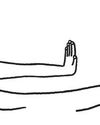
For many years, Weil subsisted on a starvation diet, in solidarity with the hungry.
The French philosopher Simone Weil was a soul at odds with herself and with a world of affliction. The causes she espoused as a social activist and the faith she professed as a mystic were urgent to her and, as she saw it, to humanity. Little of her work was published in her lifetime, but since her death, at thirty-four, in 1943, it has inspired an almost cultlike following among readers who share her hunger for grace, and for what she called “decreation”—deliverance from enthrallment to the self.
Eminent theologians have revered Weil (Paul Tillich, Thomas Merton, Pope Paul VI), and so have writers of the first rank, especially women (Hannah Arendt, Ingeborg Bachmann, Anne Carson, Flannery O’Connor, Susan Sontag). Albert Camus hailed her as “the only great spirit of our time.” T. S. Eliot credited her with a “genius akin to that of the saints.” But Weil herself might have objected to these consecrations as a form of “idolatry,” which she defined as a misguided thirst for “absolute good.” Nothing is so absolute about her as the difficulty of parsing her contradictions. Her writing radiates a cosmic empathy that coexists, sometimes on the same page, with a strain of intolerance blind to life’s tragicomedy. She resists any system that enslaves the individual to a collective, but her own vision of an enlightened society—the subject of her most famous work, “The Need for Roots”—is an autocracy modelled on Plato’s Republic. Weil would gladly have died fighting the Nazis. Yet even as her Jewish family fled the Final Solution, she condemned Judaism with what her biographer Francine du Plessix Gray justly calls “hysterical repugnance.”
This story is from the {{IssueName}} edition of {{MagazineName}}.
Start your 7-day Magzter GOLD free trial to access thousands of curated premium stories, and 9,000+ magazines and newspapers.
Already a subscriber ? Sign In
This story is from the {{IssueName}} edition of {{MagazineName}}.
Start your 7-day Magzter GOLD free trial to access thousands of curated premium stories, and 9,000+ magazines and newspapers.
Already a subscriber? Sign In

BADDIE ISSUES
\"Wicked\" and \"Gladiator II.\"

LET'S MAKE A DEAL
\"Death Becomes Her\" and \"Burnout Paradise.\"

ANTI HEROES
\"The Franchise,\" on HBO.

FELLOW-TRAVELLERS
The surprisingly sunny origins of the Frankfurt School.

NOW YOU SEE ME
John Singer Sargent's strange, slippery portraits of an art dealer's family.

PARIS FRIEND - SHUANG XUETAO
Xiaoguo had a terror of thirst, so he kept a glass of water on the table beside his hospital bed. As soon as it was empty, he asked me to refill it. I wanted to warn him that this was unhealthy - guzzling water all night long puts pressure on the kidneys, and pissing that much couldn't be good for his injury. He was tall, though, so I decided his insides could probably cope.

WILD SIDE
Is Lake Tahoe's bear boom getting out of hand?

GETTING A GRIP
Robots learn to use their hands.

WITHHOLDING SEX FROM MY WIFE
In the wake of [the] election, progressive women, who are outraged over Donald Trump's victory at the ballot box, have taken to social media with public, vengeful vows of chastity. - The Free Press.

DEADLINE EXTENSION
Old age, reborn.